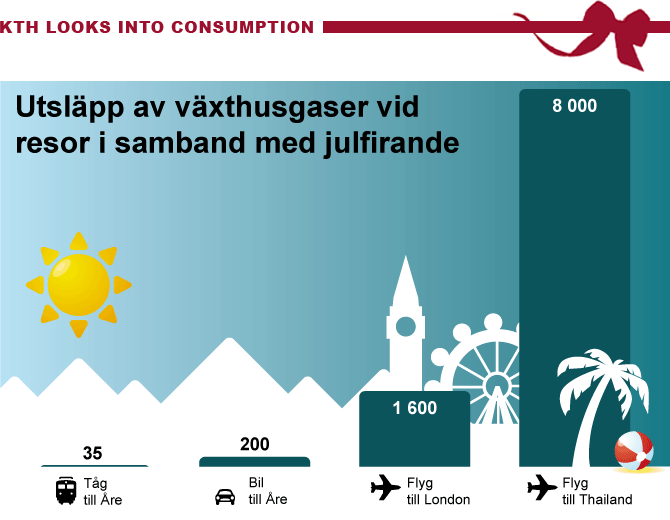
Holiday travel can be climate smart
Flying the family to Thailand to celebrate the holidays? Maybe taking the train to Åre? The difference in climate impact is considerable, according to environmental research. The greenhouse gas emissions created by a round-trip flight from Sweden to the beaches of Southeast Asia is roughly 200 times greater than the amount generated by a rail trip from Stockholm to the Swedish mountains.
From an environmental perspective, Christmas travel is no more harmful than the rest of the year, according transport and environmental researcher Jonas Åkerman. But the holiday traffic underscores a trend that has a big impact on climate change – increasing long-distance air travel.

“It becomes especially clear during the holidays. Air travel is leading to major environmental impacts that are not consistent with our climate targets. The problem is also that the airline industry is increasing its emissions more than other sectors of society.
Last year the number of Swedes traveling by air in December increased by more than 120,000. The peak was reached during the holiday season.
“International travel around Christmas has increased in recent years. More are away during the Christmas holiday itself, and slightly more are traveling even on Christmas Eve and the following days,” says Åsa Ohman at Swedavia's press service.
For the travel companies, the picture is similar – an ever increasing number spend the Christmas holiday in the sun and heat, and the trips reach farther. First it was the Canary Islands, then came Thailand, and in recent years an upstart called the Caribbean.
The environmental cost
How much does a Swedish family Christmas celebration cost in terms of environmental impact? Åkerman gives the rundown on how different modes of travel differ: a flight to Thailand causing 8 tonnes of greenhouse gas emissions, a drive to Åre creates 200 kg, and the same journey by train generates only 35 kg.
How can we travel over Christmas with a clear environmental conscience?
“People should consider Christmas no differently than the rest of the year. As usual, people should consider travel mode and destination. Within Sweden, train and bus are the best options. If you travel abroad, it is the destination that counts.”
But the greatest opportunities to move towards more environmentally-friendly travel are within the political system, Åkerman says. For air travel, he wants to see increased taxes, based on the principle that the price of a flight should reflect its environmental impact.
In the absence of international agreements, the most effective taxes are not going to be introduced. So, we can do the next best thing, he says.
“We should impose provisional measures such as a passenger tax. They are a bit obtuse, but significantly better than the current situation,” he says. “If we are to reach our climate goals, we do not have time to wait for international agreements. And when these agreements are finally reached, we can phase the measures out.
Car traffic is stagnating
For car traffic’s part, he sees an improvement. Driving has not increased significantly in Sweden since the mid-2000s, despite an increase in population. But during the Christmas season – even though many people are off work – there are as many cars on the road as on ordinary days.
Each day about 1.2 million people travel by car to visit friends and family. Compared to the train, the difference is big. Sweden’s national passenger rail service, SJ, has on average about 40,000 passengers per day during the holiday season, with sharp peaks on the days before and after Christmas. Swebus, which serves half of the market for express bus routes, carries about 11,000 travelers a day before Christmas Eve.
If trains and buses are to compete with cars they need more support from politicians, Åkerman says. Among other things, he wants to see better maintenance of railways to increase rail traffic reliability.
Daily life without car
But above all, it is about making it easier for people to lead a smooth daily life without having to own a car. In such circumstances, the car should be a less economical alternative for travelers, he says:
“When the choice is whether to rent a car, the train and bus should be far more competitive than they are today.”
Environmental technologies then - what can they contribute to environmentally-friendly travel?
“More effective technology and better fuel. But technology alone cannot reach far enough,” Åkerman says.
For his own part, Åkerman says he will travel to Söderhamn over Christmas: “Last year, we took the train up, but this time it will be enough to carpool.”
And what do you want for Christmas?
“If we can achieve the climate goals of no more than two degrees temperature increase by 2050. That would be a future Christmas present that would make me really happy.”
Christer Gummeson